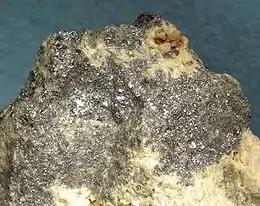| Clausthalite | |
|---|---|
 | |
| General | |
| Category | Selenide mineral |
| Formula (repeating unit) | PbSe |
| IMA symbol | Cth[1] |
| Strunz classification | 2.CD.10 |
| Dana classification | 02.08.01.02 |
| Crystal system | Isometric |
| Crystal class | Hexoctahedral (m3m) H-M symbol: (4/m 3 2/m) |
| Space group | Fm3m |
| Identification | |
| Color | Bluish gray to lead-gray |
| Crystal habit | Massive to granular with euhedral crystals |
| Cleavage | {001} Perfect, {010} Perfect, {100} Perfect |
| Mohs scale hardness | 2.5 |
| Luster | Metallic |
| Streak | grayish black |
| Diaphaneity | opaque |
| Specific gravity | 7.6–8.8 |
| References | [2][3][4][5] |
Clausthalite is a lead selenide mineral, PbSe. It forms a solid solution series with galena PbS.
Occurrence
It occurs in low-sulfur hydrothermal deposits with other selenides and in mercury deposits. It is associated with tiemannite, klockmannite, berzelianite, umangite, gold, stibiopalladinite and uraninite.[3]
It was first described in 1832 and named for the discovery locality of Clausthal-Zellerfeld in the Harz Mountains, Germany.[5]
See also
References
- ↑ Warr, L.N. (2021). "IMA–CNMNC approved mineral symbols". Mineralogical Magazine. 85 (3): 291–320. Bibcode:2021MinM...85..291W. doi:10.1180/mgm.2021.43. S2CID 235729616.
- ↑ Mineralienatlas
- 1 2 http://rruff.geo.arizona.edu/doclib/hom/clausthalite.pdf Handbook of Mineralogy
- ↑ http://webmineral.com/data/Clausthalite.shtml Webmineral data
- 1 2 http://www.mindat.org/min-1061.html Mindat
Wikimedia Commons has media related to Clausthalite.
This article is issued from Wikipedia. The text is licensed under Creative Commons - Attribution - Sharealike. Additional terms may apply for the media files.